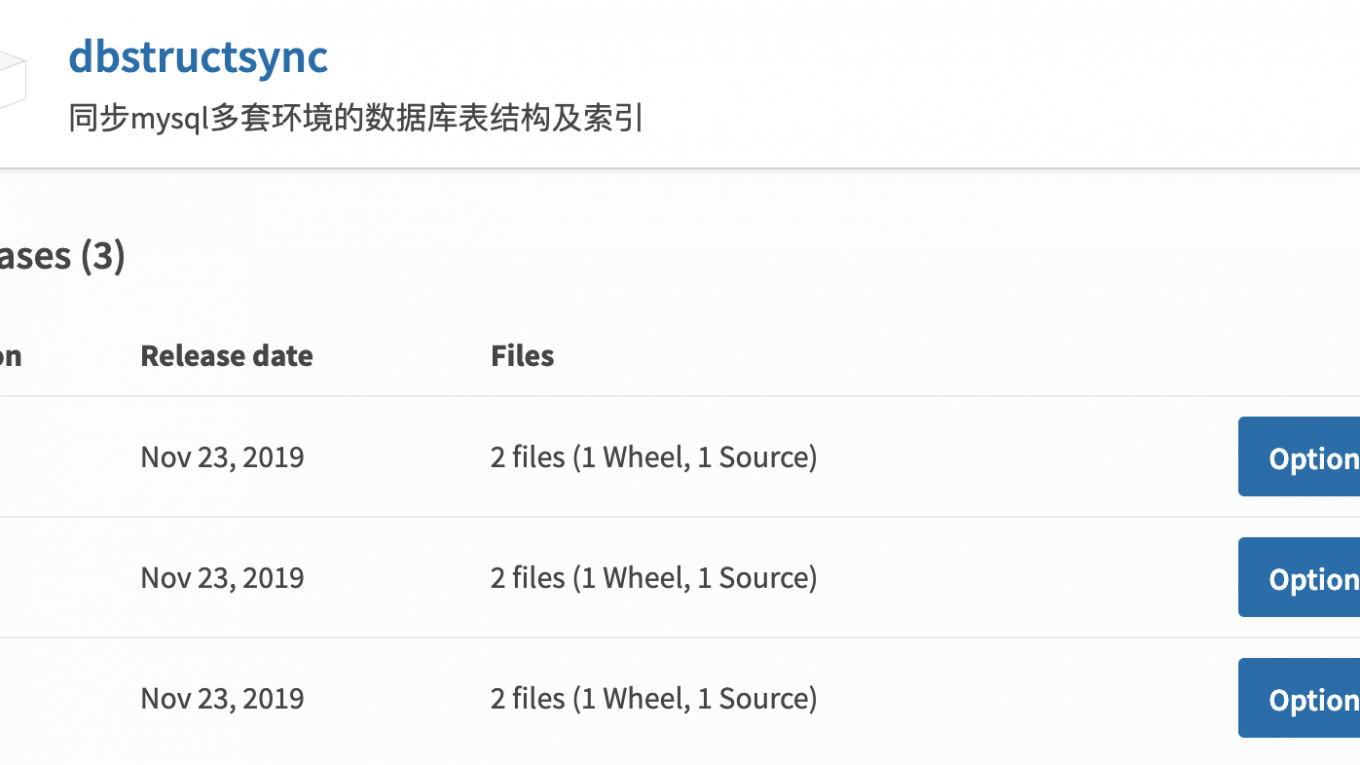dbstructsync -mysql表、字段、索引差異解析工具(原創)
最近寫了一個工具(比較兩套測試環境mysql數據庫中表、表字段、索引的差異,基於python)通過文章簡單介紹下工具的相關內容
- 工具名稱
- 主要功能
- 具體使用方法
- 部分實現代碼
- 後續
一、工具名稱:
dbstructsync (python庫)
二、主要功能:
比較兩套環境中mysql指定庫中表、表字段及索引的差異,返回同步的sql ,裡面包含建表,修改索引,修改字段的sql .
A環境的數據庫db 作為sourcedb, B環境的數據庫db targetdb ,程序邏輯比較的是 sourcedb 與targetdb 的差異,然後返回一個list的數據類型
list中包含新建表sql,修改、增加字段sql, 刪除、新增索引sql
現在總共有3個版本,0.0.1 和0.0.2 存在一定的bug, 所以請使用最新的0.0.3版本
其他說明:由於是剛完成不久的程序,所以暫時不對最終結果sql進行執行,避免對使用過程中產生不好的影響,這個版本大家可以通過python 自行選擇需要執行哪些操作;隨着之後程序的逐步深入修改和演變,會將執行sql這一步也都加進去
同時也會優化使用方式,讓使用這個工具的小夥伴更容易操作
三、具體使用方法:
1、 pip install -i https://pypi.python.org/pypi dbstructsync
在代碼里引入使用,
from DbStructSync import cli result=cli.db_sync(sourcedb, targetdb) #sourcedb,targetdb是兩個dict的參數,具體參數看下面 # 這裏得到的 result = ['use 庫;', # 'CREATE TABLE `test_async` (\n `test_async` #varchar(30) NOT NULL,\n `aa` varchar(400) DEFAULT NULL,\n #PRIMARY KEY (`test_async`)\n) ENGINE=InnoDB DEFAULT #CHARSET=utf8;', # 'drop index `index_chaxx` on chanxx_auto_puxx_conf;', # 'create index `index_chaxx` on #chanxx_auto_puxx_conf(`channel_nxx`,`channel_prxx`) USING #BTREE;'] #result 中包含 use 庫; # 如果有少的表,會有 create table的數據; 如果有不同的索引,會#存在drop index 和create index的sql; # 如果有不同的字段,會有alter table的sql ; #只需要對這個結果,再通過pymysql的一些數據庫操作就可以保證 sourcedb #的內容與taragetdb一致。
2、同時還支持命令行操作,代碼寫入到x.py代碼中
result = cli.db_sync_commandline()
python x.py --source host=10.1.1.x,port=3306,user=root,passwd=root,db=investx --target host=10.1.1.x,port=3306,user=root,passwd=root,db=investx
命令行中 –source key=value;key2=value2;key3=value3 –target key=value;key2=value2;key3=value3
–source, –target 是兩給必輸的參數,後續的值會作為一個dict類型傳入程序。 –source是源庫的信息, –target是目標庫的信息
還包括其他幾個命令參數 –only-index , –only-fields ; –only-index 只比較索引差異, –only-fields 只比較字段差異, 非必填,默認都為False
四、部分實現代碼:
def diff_tables(sourcetable, targettable): ''' :param sourcetable: 源數據庫的表名列表 :param targettable: 目的數據庫的表名列表 :return: 返回dict,包含三種結果,源庫多的表,目標庫多的表,相同的表 ''' logger.info('開始比較兩個庫中表的差異,源庫表{},目標庫表{}'.format(sourcetable, targettable)) table_result={} if not isinstance(sourcetable, list) or not isinstance(targettable, list): raise TypeError('sourcetable , targettable的類型不是list') source_diff = set(sourcetable) - set(targettable) target_diff = set(targettable) - set(sourcetable) same_tables = set(sourcetable)& set(targettable) table_result['source'] = source_diff table_result['target'] = target_diff table_result['same'] = same_tables logger.info('兩個庫中表的差異結果{}'.format(table_result)) return table_result def diff_indexs_fields(sourcesql, targetsql, type=1): ''' :param sourcesql: 源數據庫表的創建sql :param targetsql: 目標數據表的創建sql :return: 記錄下索引不一致的地方 ''' result = {} logger.info('解析語句中的索引字段,並進行比較索引') sourcesql = parse_str(sourcesql) # 從括號中提取需要的內容 #logger.info('從括號中提取出來的信息數據{}'.format(sourcesql)) sourcesql = lists2str(sourcesql) #將list轉換為str,並對數據的空格數據進行處理 logger.info('解析完的數據的信息{}'.format(sourcesql)) sourcesql = sourcesql.split('\n') #將str按照'\\n'進行分割 logger.info('解析完數據之後的信息{}'.format(sourcesql)) targetsql = parse_str(targetsql) targetsql = lists2str(targetsql) targetsql = targetsql.split('\n') if type ==1: source_index = parse_fields(sourcesql,type) target_index = parse_fields(targetsql,type) result= compare_indexs_field(source_index, target_index, type) elif type ==2: source_field_sql = parse_fields(sourcesql, type) target_field_sql = parse_fields(targetsql, type) result = compare_indexs_field(source_field_sql, target_field_sql, type) return result def dict2sql(dict_str): ''' 將解析完成的數據轉換為對應的可執行sql :param dict_str: :return: ''' dict_str = copy.deepcopy(dict_str) # 做一個深度copy,可以放心的進行相關數據處理 if not isinstance(dict_str, dict): raise TypeError('調用方法{}參數不是dict類型,請確認'.format('dict2sql')) #獲取db名字 for key ,value in dict_str.items(): dbname = key logger.info('數據庫名{}'.format(dbname)) for table, table_desc in value.get('source').items(): if table =='create_table': #create_table_sql = lists2str(table_desc) dict_str[dbname]['source'][table] = table_desc #其他的都是table的名字 logger.info('數據庫的修改語句:{}'.format(table_desc)) else: logger.info('對於索引和字段的解析原始數據{}'.format(table_desc)) if table_desc.get('index'): create_index_sql_lists=[] #create_index_sql_lists.append('use {};'.format(dbname)) index_lists= (table_desc.get('index')) result_index= parse_comma_split(str(index_lists)[1:-1]) for i in result_index: if i.strip().startswith('\'KEY'): #print(i.strip()) index_values = parse_space_split(i.strip()) drop_index_sql= 'drop index {} on {}'.format(index_values[1],table ) if len(index_values)<=3: create_index_sql='create index {} on {}{} '.format(index_values[1], table, index_values[2]) else: create_index_sql='create index {} on {}{} {}'.format(index_values[1], table, index_values[2], ' '.join(index_values[3:])) create_index_sql_lists.append(drop_index_sql) create_index_sql_lists.append(create_index_sql) if i.strip().startswith('\'UNIQUE KEY'): index_values = parse_space_split(i.strip()) drop_index_sql = 'drop index {} on {}'.format(index_values[2], table) if len(index_values) <= 4: create_index_sql = 'create unique index {} on {}{} '.format(index_values[2], table, index_values[3]) else: create_index_sql = 'create unique index {} on {}{} {}'.format(index_values[2], table, index_values[3], ' '.join(index_values[4:]), ) create_index_sql_lists.append(drop_index_sql) create_index_sql_lists.append(create_index_sql) logger.info('表{}解析出來的索引的修改sql{}'.format(table, create_index_sql_lists)) dict_str[dbname]['source'][table]['index'] = create_index_sql_lists if table_desc.get('fields'): create_fields_sql_lists=[] #create_fields_sql_lists.append('use {};'.format(dbname)) modify_field_sqls = table_desc.get('fields').get('modify',None) create_field_sqls=table_desc.get('fields').get('lose',None) if modify_field_sqls: for modify_field_sql in modify_field_sqls: sql_indexs = parse_space_split(str(modify_field_sql)[0:-1]) #print(sql_indexs) alter_fields_sql='alter table {} modify column {} {} {}'.format(table, sql_indexs[0],sql_indexs[1],' '.join(sql_indexs[2:])) create_fields_sql_lists.append(alter_fields_sql) if create_field_sqls: for create_field_sql in create_field_sqls: sql_indexs = parse_space_split(str(create_field_sql)[0:-1]) create_fields_sql='alter table {} add column {} {}'.format(table, sql_indexs[0],' '.join(sql_indexs[2:])) create_fields_sql_lists.append(create_fields_sql) logger.info('表{}解析出來的字段的修改sql{}'.format(table,create_fields_sql_lists)) dict_str[dbname]['source'][table]['fields'] = create_fields_sql_lists return dict_str # 返回給一個全部是可執行sql的dict
五、後續:
1、對使用過程中遇到對bug進行修復
2、對代碼進行優化
3、增加其他相關功能,讓工具越來越好用
4、希望使用的小夥伴多提意見,未來成為一個好用的小工具
本站聲明:網站內容來源於博客園,如有侵權,請聯繫我們,我們將及時處理【其他文章推薦】
※網頁設計公司推薦更多不同的設計風格,搶佔消費者視覺第一線
※廣告預算用在刀口上,網站設計公司幫您達到更多曝光效益
※自行創業 缺乏曝光? 下一步"網站設計"幫您第一時間規劃公司的門面形象
